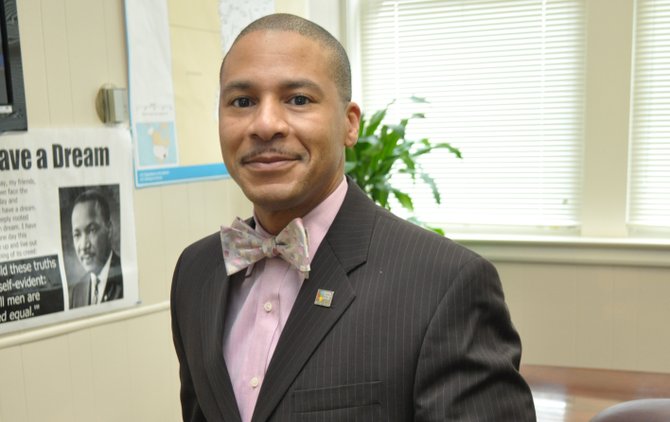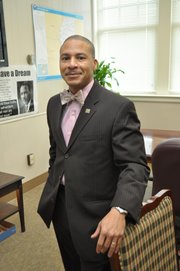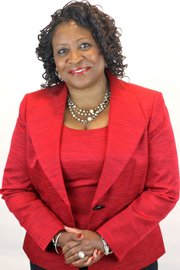On a drizzly early April evening, a group of students, parents and educators gathered at Provine High School's auditorium for a town hall meeting. The subject was dropout prevention.
Scattered in a room designed to hold several hundred, about 75 people showed up for "Stop the Drop: What We Can Do to Keep Mississippi Students in School," sponsored by Mississippi Public Broadcasting, American Graduate and the Corporation for Public Broadcasting.
The town hall turned out to be a panel presentation, for the most part, with the four adults on the seven-member panel doing most of the talking. They urged the students to think about the effects of dropping out versus the gains they could make by staying in school and graduating.
Panelist Patricia Anderson, the parent of a Provine junior and a member of Parents for Public Schools, asked the students whether they liked what they saw in people who had dropped out. "I'm sure all of us know of someone that's dropped out of high school who's probably said on more than one occasion, 'If I could go back and do it again, I would do things differently,'" she said. "... Dropping out should not be an option or a consideration."
Parents play a vital role in their children's success, stressed Adetokunbo Oredein, senior project director with 100 Black Men of Jackson. And parents, along with teachers and administrators, must hold each other accountable. Parents, especially, he said, need to step up and stay involved.
"In order for the teachers to be effective, they have to know that parents are on the team," he said. "And it is a team. If you have a student not doing well, and the parent never comes (to meetings or events), that's not a team."
Provine's principal, Laketia Marshall-Thomas, talked about some of the ways parents could help their kids, such as working through online tutorials together. "All of the assignments (and tutorials) are posted online, and you have access to those grades," she said.
"I check my child's grades every day," Thomas said. "Do not take (your child's) word for it, because you don't want any surprises."
Over the course of the evening, the panel touched briefly on many of the challenges Jackson teens face on the road to graduation, including peer pressure, bullying, teen pregnancy, and the ever-present and unanimously disliked tests. Panel participants, who included three Provine students, agreed that it also takes students encouraging other students to stay in school as they struggle with those issues.
"Hold on to your classmates," Thomas urged the students.
Struggling to Make It
Provine High School, which sits at the corner of Robinson Road and Ellis Avenue just northwest of Jackson State University, was an apt location for the gathering. In Mississippi's only urban and its second-largest school district, Provine's graduation rate was 52.5 percent in the 2010-2011 school year. It's a dismal showing in a district where even the best schools struggle to exceed the state's average graduation rate--an already bleak 74 percent.
Provine was at the bottom of high schools in the district and was ninth from the bottom in the state. At the top of the district's high schools for 2010-2011, Bailey Magnet (now Bailey APAC Middle School) graduated 77.6 percent of its students. Only one other school, Murrah High School, did better than the state average, at 75.6 percent.
The Jackson Public Schools district has a lot of challenges, including a chronic shortage of funds. Mississippi's per-pupil expenditure for 2011 was $7,928, compared to the national average of $10,560, and it dropped 2.5 percent from the previous year.
Poverty also takes a high toll. The state Legislature has consistently short-changed the Mississippi Adequate Education Program, the funding formula designed to level funding for the state's poorest school districts. Poverty in the state skews heavily toward blacks. In the poorest state in the union, Jackson's poverty rate for African Americans in 2009 topped 40 percent. Nearly 90 percent of JPS' 30,000 students, which are 97 percent African American, qualify for free or reduced school lunches.
Because education is one of the key drivers for lifting people out of poverty, the city's high poverty rate indicates poor educational achievement among its residents. To put that in context, a bachelor's degree more than doubles earning power: A high-school dropout could expect a $451 weekly paycheck, while a college grad made $1,053, 2011 U.S. Bureau of Labor statistics revealed. Just having a high-school diploma added $187 to a person's average weekly earnings. And even in a tough job market, the unemployment rate shrinks steadily for those with more education.
The cycle of poverty is a tough nut to crack; poverty and lack of education, like wealth and Ivy League diplomas, tend to transfer generationally. It also indicates that many Jackson parents lack the resources to provide the kind of nurturing, hands-on involvement that children need to succeed in school. A 2012 ACLU report, "Finding Our Way Back to First," identified one of the barriers:
"Unfortunately, many children of color, particularly those who are poor and of color, miss out on a language-rich environment in their formative years. ... Low-income families tend to have fewer books in their homes, less access to good libraries, and less access to computer and Internet resources. Also, by age 3, higher income families have said 30 million more words to their children than lower income families."
It Still Takes a Village
Young people come into school with myriad problems, which then frequently land in the lap of the public schools to deal with.
Beneta Burt, JPS board member and executive director of the Jackson Roadmap to Health Equity Project (a nonprofit that advocates for healthy change in institutions such as schools), believes that the public schools alone can't fix the problems. The involvement of whole community is needed.
"When you have the public sector and the private sector--including parents and other community members--working together, then you start thinking about a positive atmosphere for the entire city and the school district," Burt said.
"It has to be more than just the school system working on these issues. We have to figure out how to generate some parental support, and continued and sustained parental involvement."
Public institutions, private businesses and citizens, churches, and community-based organizations should all take part in finding and implementing solutions, Burt said, all "taking up the banner" for doing the necessary work.
"All of us have a responsibility to alleviate some of the social ills that we have to deal with, so that when kids go to school, they don't have so many of them to deal with," Burt said. "Because these are our children, we have to figure out how to collectively mobilize the community."
Burt pointed to a Tennessee program, Alignment Nashville, as a best-practice model for Jackson. The program is a collaborative, community-wide effort to improve outcomes for students, and it is showing success. Nashville has improved its graduation rates and school rankings since putting the program into place.
JPS superintendent Cedrick Gray also wants to ensure that students, parents and the community all become part of the solution for lifting the district from the doldrums. Gray, who took the reins a year ago, instituted a Parent Impact Symposium, for example, designed to give parents a direct way to communicate with JPS and for the administration to provide vital information to parents. For her part, Burt encourages parents to attend school board meetings.
"If we don't know the concerns of the community, then we really can't address them," Burt said.
Connecting Dots
One of the district's focal points this year is to increase the learning levels for the city's youngest learners. Last year, 600 of Jackson's 2,100 4-year-olds made it into a city pre-kindergarten program, but Gray expects an increase in those numbers this year. His office is also working to reach the kids not in city programs and JPS will be making professional development available to independent day-care providers on request, he said.
"We shouldn't limit ourselves to just the (children) that come to us," Gray said. "We should go out and assist those day cares in preparation for the children that come to JPS kindergarten."
Gray is taking a multi-pronged approach to increasing literacy throughout the district. The first is to involve parents, which he said is key.
"I'll be asking parents to assess their own child's reading ability, just by listening to (their) child read," he said. "If you determine that your child doesn't read as well as you think a comparable child in the same grade does, then we need to know that."
A second initiative will provide the district with a baseline for literacy and numeracy. Every child starting school in JPS this year will receive diagnostic testing to gauge his or her readiness to learn.
"Our goal is to increase graduation rates by 2 percent (per year) over the next three years," Gray said. He also wants to see all students career or college-ready, which he defined as preparing students for life. "It's ambitious, but what else do we show up to work to do?"
Gray wants to make inroads with all levels of education in Jackson--elementary, middle and high school. A challenge at the elementary level is the governor's "3rd-grade gate," whereby young scholars who can't read proficiently at the end of third grade will not advance. That initiative forces all Mississippi schools to re-evaluate how they are preparing kids for 3rd grade and what they're teaching once they get there.
For JPS, that means putting students' progress under a microscope with the help of teachers' and parents' assessments, in addition to tracking attendance and behavior. Training for the teams (Gray called them FIT, which stands for Focus Instructional Teams) that will manage the process took place this summer.
"We'll be able to identify these students (who need extra help) very early in the process, early in the school year, and apply the appropriate interventions," Gray said. "What we won't do is wait until the tests in May. Schools will literally be identifying students on a week-by-week basis."
Part of the FIT training is for the common core, which Mississippi adopted in 2010. Gray sees common core as beneficial, despite the program having garnered vocal detractors who say it will eliminate flexibility and local context in education. Advocates insist that it will increase critical-thinking skills through more evaluation and analysis across disciplines. The jury is still out, but 45 states and the District of Columbia have taken common core on.
Common core will require schools to "dig deeper," Gray said, but it also lends itself to the districts' goals.
"My estimation is this: They're standards. They say what a student should know and/or be able to do for a certain grade," he said. "They say 'what'; we determine the 'how.'"
"It requires innovative teachers and people who are dedicated to the work," Burt said.
Opening Doors
Warning Signs
Specific factors are warning signs for students who are likely to drop out of school. If you see one or more of these signs, get involved. You can give these students the boost they need to stay in school.
• They don't feel challenged in school.
• They don't feel high educational expectations from family or school.
• They believe their parents are too controlling, and they want to rebel.
• They have trouble with schoolwork or feel that they are not as smart as other students.
• They have drug, alcohol or mental-health problems.
• They regularly miss school or are frequently tardy.
• They struggle with problems at home, including physical or verbal abuse.
• They feel like they don't fit in or have friends at school.
• Their peers or siblings have dropped out of school.
• They have poor learning conditions at school--overcrowding, high levels of violence and excessive absenteeism.
SOURCE: Boostup.org
Get Involved
100 Black Men of Jackson
5360 Highland Drive
601-366-8301
Big Brothers Big Sisters of Mississippi
175 E. Capitol St.
601-961-9286
Jackson Public Schools
P.O. Box 2338, Jackson 39225
601-960-8700
jackson.k12.ms.us
Mississippi Community Education Center
1435-B Lelia Drive
601-366-6405
Mississippi Learning Institute
Jackson State University
1400 Lynch St.
601-979-2121
Mississippi PTA/PSA
P.O. Box 1937, Jackson 39215
601-352-7383
Parents for Public Schools of Jackson
200 N. Congress St.
601-969-6936
Gray has four things he wants every parent to take on for the coming school year: "Number one: Take your child to school on the first day. Number two: Exchange a working number with your child's teacher. Number three: Secure a quiet space at home for at least an hour for homework. And number four: Check homework, report cards and homework folders on a regular basis."
Otis Gaines, Provine's basketball coach, rounded out the dropout prevention program last April. Dressed in a T-shirt, gray sweat pants and sneakers, Gaines was reluctant to speak at first, but when he did, he inspired an ovation from the attendees.
A Jackson native, Gaines graduated from Provine in 1999 and played on the school's 1998 state championship basketball team. He now holds a bachelor's degree from JSU, a master's from William Carey University, and is pursuing a doctorate from the University of Southern Mississippi.
"If anybody ever tells you (that) you can't get a good education at Provine, that's a lie," he said.
Gaines works hard to instill the notion that education is the key to success in the young men he coaches. His players may find themselves in the elite cadre that make it into pro sports, but a solid education will always serve them--even if that dream career doesn't pan out.
His own education was a path that began with effort, Gaines said, but, just as practice had him become a good basketball player, practice also made him a good student. Learning became easier, and the benefits were in direct proportion to the work he put in.
Gaines' mother served as his mentor and an inspiration: After dropping out of school to raise a family, she received her bachelor's degree on the same day as her youngest daughter. Now in her 50s, Gaines' mother will receive her master's degree next year.
"Staying in school, regardless of what anybody says, that's the best thing you can do," he said. "Because there are so many more doors that are going to open."
UPDATED Aug 2, 2013: Adetokunbo Oredein is no longer the executive director of 100 Black Men of Jackson. He is now senior project director with the organization.




